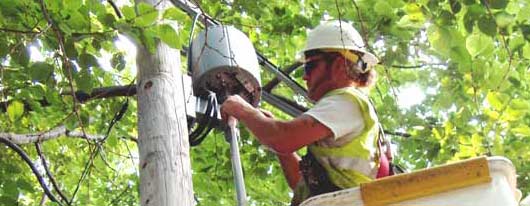
Worker adjusting the wireless access point outside my window.
Featured Tag: Wireless
Main Tags
art
blogging
learning
mac
movies
other
politics
science
tech
wireless
Sunday, August 27, 2006
Citizens League Gives Us Web & Civic Engagement
On August 22. the Citizens League presented a forum covering the Web & Civic Engagement. You can see it here or listen to it here or just see some photos here including yours truly.
The panel included non-techies and techies. The talk was thought-provoking and statements and audience questions embodied fears and hopes for the evolving networked world. Jen Alstad, Garrick Van Buren, and Steve Borscht represented the Net's unlimited possibilities while Tom Swain and Jean King kept us grounded with the way things were done in the distant past (last year or thereabouts).
PF Hyper highlights...
Jean (Levander) King (daughter of Minnesota Governor Harold Levander) told a story about Minnesota Governor Al Quie's administration, where she had a job. Gov. Quie would breakfast with Democrats once a week and discuss issues. After the breakfast, the Senator Roger Moe, DFL majority leader, would issue a statement to the press criticizing Quie. Quie was not happy with this scenario so he had Jean call Senator Moe to see if Quie could at least know what he was going to say. Senator Moe agreed. This helped in enhancing their relationship and deepening the level of trust.
I talked to Jean afterwards and mentioned that this sounded a bit like backroom politics. In the context of what we were discussing at the forum, I said, what if Gov. Quie and Senator Moe had taken turns in blogging the breakfast event and then commenting on each other's posts. This could bring some real transparency (a term that surfaced at the forum) to the workings of the political process.
Jean fielded this question well. The issue she brought up is political fear of how constituents would take it if they could see the frank discussion between the two political persuasions and the potential trade-offs that were discussed. She said voters would have to be educated in this type of political maneuvering. This is something I hadn't considered. It relates to a Dave Winer podcast I'm listening to about citizen media.(Along with Dave is Dan Gillmor who wrote We the Media which is a recommended study source for this forum). One of the conclusions of both Dan and Dave is that in this networked world we will all have more responsibility to become more informed and for filtering and choosing a balance of opinion and views to keep us informed. This goes directly to civic engagement and learning how to discriminate valid information sources and listening to a range of opinion and is something we should be teaching in our schools. It's really teaching participatory politics and, well, democracy.
The new meeting place...
Another issue that surfaced in the forum Q&A: Is the Web a substitute for getting together, for real human interactions? Steve Borscht said "No" to this but I'll refute that with a qualified "Yes." Meaning that our culture has fragmented families with children leaving the nest and finding jobs far away, sometimes overseas. Or sometimes fighting in a foreign country. The Web allows for us to talk to our daughter and sons, parents, grandparents, who live thousands of miles away. This is a good thing.
The Web also allows returns us to a commons where we can discuss issues. Blogs and wikis are two tools for working with the commons. Social software sites like MySpace are another way. We are still trying to figure out what works best.
Try to remember that no matter what you think about something like Wikipedia as a source for information, it is a thing of beauty in that all of these individuals contributed their time to write encyclopedia articles. Take some time and search Wikipedia on non-controversial topics and you'll quickly see its value.
Low barriers to publishing
Both Garrick and Steve mentioned how easy it is to blog and how little it costs. Really the cost is simply the Internet connection itself. Blogger.com -- and many other sites -- provide free blogging space that's easy to use even for those not totally immersed in technology.
As I blog this post, I'm listening to the forum replay via the Net in order to check some of the stuff I'm blogging about. I've linked you, dear reader, to my original sources so you can fact check the hell out of this and add to it via the comments. My comments are open, no moderation, and as long as you fit my definition of respectful, your comment will remain attached to this blog hopefully for many years into the future.
There is no publishing scenario like this in the print world. Yes, I can send a letter to the editor but that letter will be judged worthy or not worthy for publication. Paper and printing carries an inches limit, right? They don't have infinite space. The space they do have needs to be paid for with advertising. A blog has infinite space with little cost except the personal time it takes to publish. There is little reason to limit the comments.
Concluding
Thanks to the Citizens League for organizing this forum and thanks to Minnesota Public Radio for hosting it. This is a critical issue that needs coverage in forums and the press as we are moving quickly to the networked world. Unless we really try to understand it and its potential, we could end up with a future Internet that is little more than a glorified cable tv system.
Bonus Links
Garrick Van Buren, one of the panelists, blogs the event here .
Cluetrain Manifesto (a manual for living in the Web 2.0 world)

